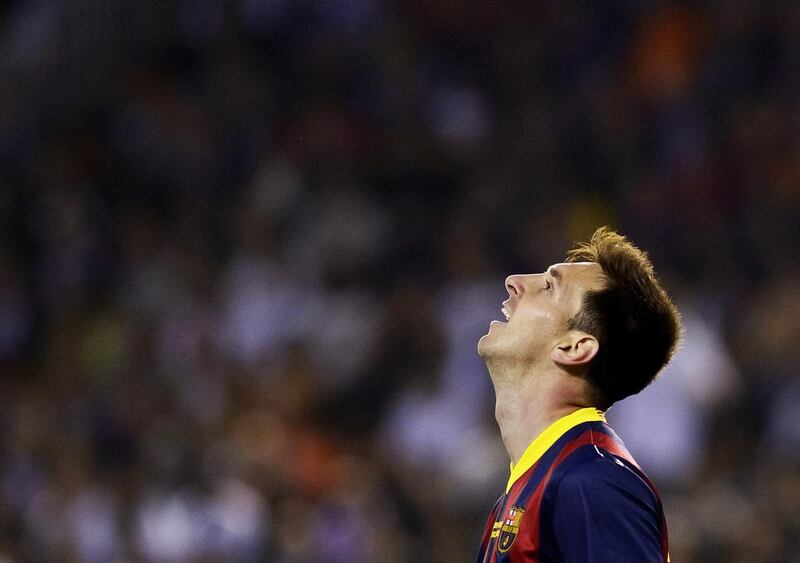The 1980s were drawing to a close and U2, the most successful rock band of the decade, looked to be a spent force. Their latest album, Rattle And Hum, had polarised opinion. The general consensus was the group had run out of ideas.
“We have to go away and dream it all up again,” Bono famously said at a concert in Dublin on December 30, 1989. It was the end of an era.
As Lionel Messi, Xavi and Andres Iniesta watched Atletico Madrid and bitter rivals Real Madrid fight for the Uefa Champions League on Saturday, it is tempting to think they were thinking something along those lines.
Last Sunday Barcelona surrendered the Primera Liga to Atletico at Camp Nou and, for the third season running, were nowhere to be seen when the continent’s top prize was contested.
Barca’s golden age, the age of tiki taka, is seemingly over. If it is, then Messi and his teammates should be thanked for flirting with football perfection like no other team.
Yet there is a distinct whiff of schadenfreude surrounding their slow demise.
It is no surprise. The modern football fan is not the most empathetic of creatures. Witness the season-long wallowing in the misfortunes of David Moyes and Manchester United, or the widespread celebration of Steven Gerrard’s infamous slip against Chelsea.
It is part of the intertribal banter, sometimes vitriol, that has always existed in football.
Far more puzzling is the haste with which Barcelona’s entire football philosophy has been discredited. Tiki taka has been “found out”, critics claim ungenerously – six years suddenly invalidated.
Football ideology is one thing, but successful teams come in cycles. Barcelona have simply reached the natural end of a glorious one.
Managerial changes, injuries, collective loss of form and old age have all contributed. But the Barcelona of 2008-2014 should be always revered as one of football's greatest, most innovative teams.
Historically, club and international teams that revolutionised football have been fetishised by experts and fans. Even in failure.
Hungary’s stunning loss to West Germany in the 1954 World Cup final has hardly diminished the legacy of Ferenc Puskas, Nandor Hidegkuti and Sandor Kocsis. In fact, history has only embellished the legend of the “Mighty Magyars”.
At the start of the 1970s, the Dutch, led by Rinus Michels on the sideline and Johann Cruyff on the pitch, redefined the modern game with “Total Football”. Ajax won three European Cups, but the Netherlands’ defeat to West Germany in the 1974 World Cup final signalled the end of those parallel cycles.
There was nothing intrinsically wrong, or unsustainable, with Total Football – as shown by the Netherlands’ spiritual brothers Denmark in 1986 – it just relied on the right, gifted players playing the right tactics at the right time.
Then there is Brazil at the 1982 World Cup in Spain, who are often rated the greatest team to have not won the competition. A team that shone brightly but all too fleetingly.
These teams are mythologised as much for their heroic failures as their successes.
You can forgive this trophy -laden Barcelona for feeling somewhat unloved by comparison.
But even the greatest teams of the past 50 years have had long-term success punctuated by ending cycles, typically of three or four years.
Bob Paisley’s unprecedented success in nine years as Liverpool manager notably came with two teams, while Manchester United’s era of obscene success under Sir Alex Ferguson was achieved with three great teams, demarcated by barely noticeable lean periods (comparatively speaking).
The AC Milans of Arrigo Sacchi and Fabio Capello of the 1980s and 1990s – the team mostly compared to modern Barcelona – are rightly fabled for their pressing game and entertaining football.
Yet the golden era of Ruud Gullit, Marco van Basten and Frank Rijkaard everyone remembers lasted roughly between 1989-1992. The team that annihilated Barcelona in the 1994 Champions League final was part of the next cycle.
Then there is the Brazil tam of 1970, perhaps the most adored football side of all. Pele, Rivelino, Carlos Alberto, Tostao and Jairzinho. A blur of yellow and blue that elevated football to art on the way to winning the World Cup in Mexico.
Within three years that golden team’s natural cycle had ended and few associate it with the Brazil that contested the 1974 World Cup, a cynical embarrassment to the previous generation.
So why only grudging respect for Barcelona, who never deviated from their principles?
Perhaps it is a 21st century phenomenon. Modern football’s obsession with contextualising success and failure within a never-ending narrative. One day a genius, the next day a fraud.
Boring, self-indulgent and a parody of itself. Barcelona’s football, like U2’s music all those years ago, has been savaged by a cynical and impatient public.
Yet when the Irish band returned in 1991, it was with their masterpiece album, Achtung, Baby.
The challenge for new Barcelona manager Luis Enrique and his players is clear. They must go away and dream it all up again.
akhaled@thenational.ae





